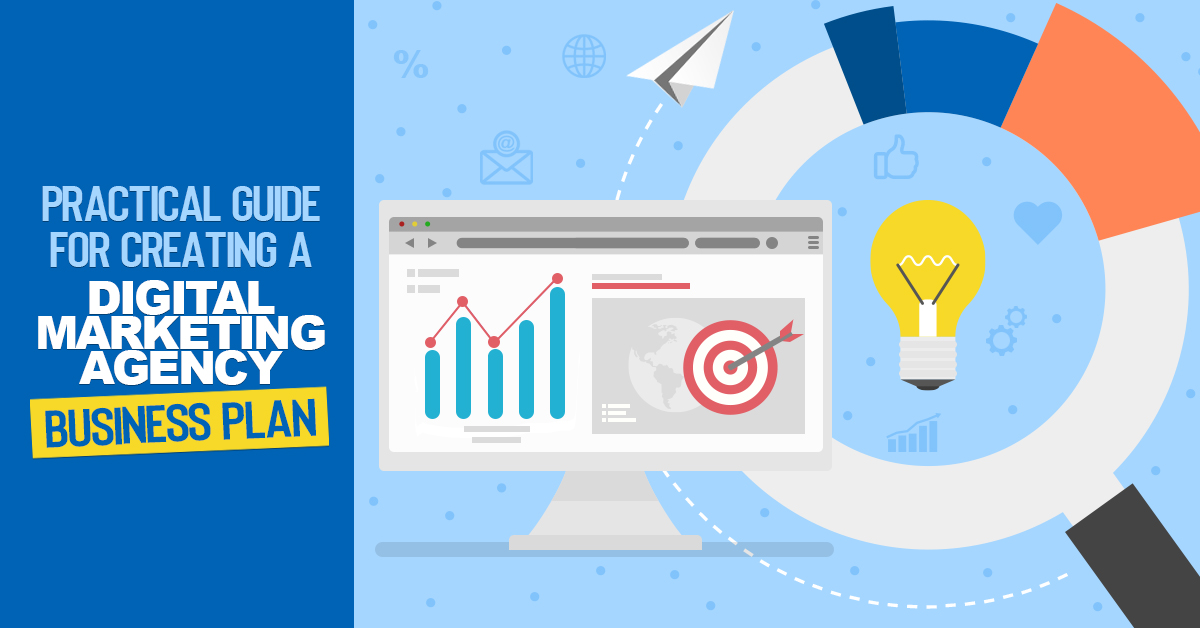Creating a digital marketing agency business plan may seem pretty straightforward. You write down your goals, your actionable steps, and voilà, you have your plan. But we all know the world of digital marketing isn’t quite so simple, and this complexity brings unique challenges to writing a business plan that’s actually worth following.
One of the biggest challenges with a digital marketing agency business plan is that work within the agency is so fluid. Digital marketing changes faster than we can say Search Engine Optimization, so developing a business plan that keeps up with that speed can present a few issues.
Another challenge to running a digital marketing agency is choosing areas of focus. Digital marketing can include everything from creating Facebook ads to running a client’s social media and writing their e-books. Since digital marketing encompasses a wide range of services, it may be hard to pinpoint which areas are the most important to focus on.
Despite these unique challenges, it’s important to put pen to paper and formulate a plan so your digital marketing agency doesn’t just survive — but thrives — in 2020 and beyond. We’ve put together this information to pull your digital marketing agency business plan together so you can get on with the business of helping your clients succeed.
Why Create a Digital Marketing Agency Business Plan?
Perhaps you think you need a business plan for your digital marketing agency, but you’re not totally convinced yet. Maybe you feel like you should concentrate on getting new clients and building your base versus spending time creating a document. But a business plan is much more than a few goals and ideas that you’ve written down.
Imagine if you were buying a home and the builder told you they decided to “wing it” and just started building without any formal plans. You would walk (or run) away as fast as possible because you can’t imagine buying a home without solid construction plans.
The same is true for a business. You can’t expect a business to succeed if there aren’t any guidelines, goals, or best practices. Statistically speaking, a 2017 study conducted by Francis J. Greene & Hopp shows businesses with a business plan had a 7% higher likelihood of high growth, versus those without a written plan.
Among other benefits, a business plan:
- Helps you understand your market
- Forces you to better understand your competition
- Establishes financial milestones
- Helps you define your customer
- Shows investors and partners how you plan to grow your business
The right business plan lays the groundwork for your business and can help you stay focused as you navigate the requirements of running a digital marketing agency.
How to Establish a Digital Marketing Agency Business Plan
It would be great if you could search for a digital marketing agency business plan template and then fill in the blanks with your agency information. However, to make a business plan work for your agency, careful thought has to be put into the plan. While there’s not a one-size-fits-all template, there are specific points you should look to include.
Define Your Audience
The first step in creating your digital marketing agency business plan is to determine who your target audience is. It may even be necessary for you to create a plan for each group that has an interest in your agency’s success.
- Internal Only: Will you write a business plan to be distributed and viewed by your employees only? This type of business plan would speak to the employees about goals, performance, and any other aspects you think are important for employees to understand.
- Stakeholders: Stakeholders are those who are investing or financing your business. Since they would be interested in reviewing a plan through a financial lens, then it’s safe to assume the plan should be focused on finances.
- Customers: A business plan that is focused on your customers, and potential customers, will clearly spell out what your digital marketing agency can offer. It could include the services you offer, new technologies you plan to implement, and anything that highlights why a potential customer should choose your agency.
Create an Overarching Theme
Now that you have your target audience established, let’s venture back to high school English class for a moment. One of the concepts you may recall being taught is finding the theme throughout a story or the novels you were forced to read.
It turns out that the concept of a theme can also be applied to your business plan. The idea is to have one central theme to help guide the business plan. It could be a mission statement for your business or it could be as simple as a concept you’d like to focus on.
Choosing the audience for your business plan is much like choosing a theme, but taking it a step further can really help you define your plans. As you are creating your business plan, decide what the big concept is for your business. Is it accelerated growth in the number of customers? Is it creating something so innovative that no other digital agency has ever implemented? Perhaps it’s only working with nonprofit organizations or providing the highest level of customer service you could imagine. Whatever your main theme is, it can help you while you’re developing your business plan.
Your mission, or central idea, could be clearly stated in an Executive Summary in your business plan and can help set the tone for the entire document.
Define Your Target Market
Once your target audience and the central concept are identified, you need to define the target market for your agency. This is how you establish which types of customers you would like your agency to work with. Perhaps you want to work with start-ups or target small business owners. Or do you want to work exclusively with technology companies? This is the time and place to identify who your digital marketing agency will benefit the most.
By defining your target customers, you can go to work on your own marketing campaign. After all, you’re in the business of helping clients establish a brand and a loyal audience, now it’s time to do the same for your company. Once you know who you want to work with the most, you can create specific goals on how you will reach your audience. This will also help you as you create specific marketing plans for your clients, whether you want to reach them by running Facebook ads or email campaigns for instance.
Your target market for your agency may change as you continue to research and analyze your biggest opportunities for your business plan. Once you have completed your entire analysis, make sure your target audience aligns with the goals you’ve set for your company.
Clearly Define Business Goals Based on Real Numbers
Whether you love statistics or hate them with a passion, you can’t run a business without looking at real numbers. Fortunately, you don’t have to be a statistician to crunch numbers to add substance to your business plan. And the great thing about statistics is they don’t lie, but they can help you make fact-based decisions.
So which statistics, or numbers, should you look to include in your digital marketing agency business plan to shape your goals? There are several key analytics that are meaningful for businesses.
- Industry Analysis: What is the projected growth not only for digital marketing, but the industry you are targeting to work with? What growth would you expect for your agency based on the industry trends?
- Customer Analysis: How many clients do you currently have? How many do you need to achieve your financial goals? What will you do to continue attracting and retaining customers?
- SWOT Analysis: SWOT is short for Strengths, Weaknesses, Opportunities, and Threats. You can use this research for both your own business and other big competitors to help you determine the best opportunities for a digital agency.
- Financial Analysis: How much do you charge your clients? How much will you budget for third-party services (if you choose to use them for your agency)? Discuss how much you will budget for your own marketing plans to attract future clients. Your audience will determine how in-depth you need to go on your financials, but it’s a critical component of any business plan.
- Employee Analysis: Discuss how many employees you intend to hire and how much you will spend to recruit them. If you plan on hiring freelancers or contractors only, discuss how many you will take on and your plans to ramp up as business increases.
As you can see, the more you run these analyses, the easier you can define your goals.
For instance, you may find during your SWOT analysis that your main competition is really lacking in influencer marketing. And through your research, you may see that influencer marketing continues to show growth. One of your business goals could be to focus on using influencers to work with your clients.
Pinpoint Your Product Services
Now that you understand the numbers, you can decide which exact product services you will offer. As mentioned before, digital marketing agencies can offer a wide range of functions. It doesn’t have to be a long, drawn-out section, but it helps to give the audience of your business plan the specifics of what you will be doing. Your agency could include:
- Search engine optimization (SEO)
- Pay per click (PPC) management
- Social media management
- Content creation
- Google Analytics
- Influencer marketing
- Rich media advertising
- Sponsorship advertising
- Lead generation
- Email campaigns
- Digital display advertising
- Mobile advertising
- Consulting services
This is only a small sampling of what a digital marketing agency could offer, but it shows you how you need to clearly state what services you plan to provide.
Changes to a Business Plan
The truth is, your business will evolve over the years. Hopefully, you achieve the goals you’ve set for your digital marketing agency or maybe you’ve made mistakes along the way but have learned from them. Your business will look different each year, which is why it’s important to update your business plan.
One of the exciting aspects of business is the fact that nothing ever stays the same. This can either be exhilarating or exhausting, but your business plan is allowed to change and adapt. Make it a point to revisit your plan regularly, whether it’s semi-annually or annually, to make necessary changes. And don’t be afraid to update your plan to reflect what you know is or isn’t working for your agency.
The Digital Marketing Agency Business Plan: A Foundation for Success
It takes a lot to run a business. If only it were as easy as stocking a break room with coffee and hanging a sign on the door. Creating an agency requires careful planning, which is where the business plan can help you succeed.
The right business plan will explain who you will work with and what you need to do to achieve your goals. No two business plans will look the same, but the right plan can help any business stay on the path to success.


Leave a Reply